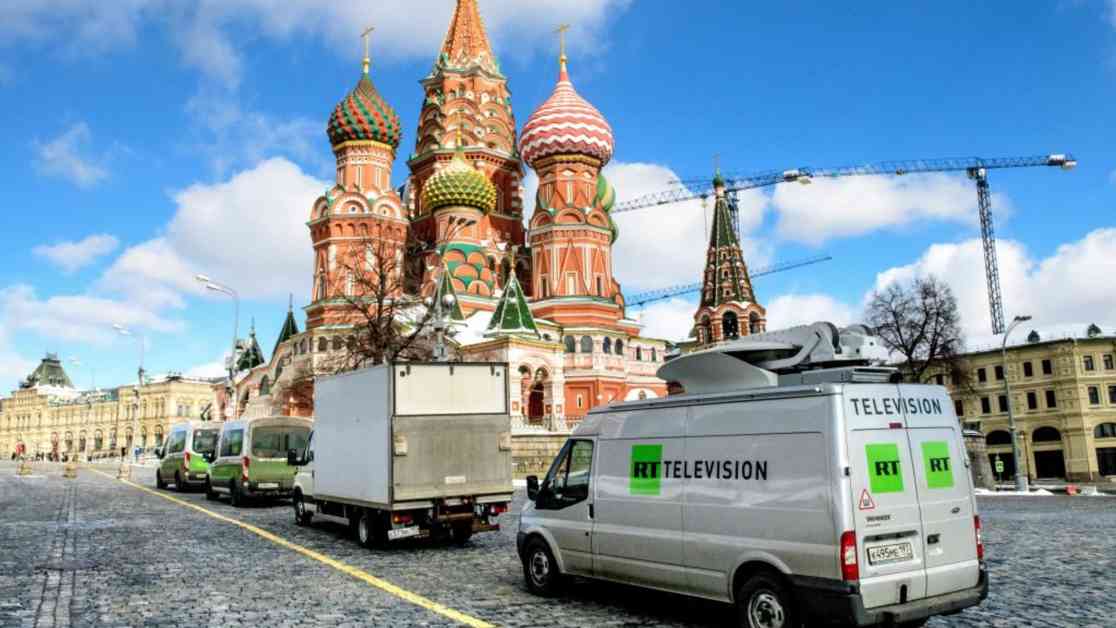Meta Takes Action Against Russian State-Controlled Media for Spreading Disinformation
In a significant move, Meta, the parent company of social media platforms like Facebook and Instagram, announced on Monday that it is banning Russian media outlet RT for spreading disinformation. This decision comes in the wake of the Biden administration’s accusations against RT, claiming that it operates as an arm of Moscow’s spy agencies.
The ban on RT is part of Meta’s ongoing efforts to combat foreign interference activity on its platforms. A spokesperson at Meta stated, “After careful consideration, we have expanded our enforcement against Russian state media outlets. Rossiya Segodnya, RT, and other related entities are now banned from our apps globally.” This action underscores the growing concerns over the role of state-controlled media in manipulating public opinion and spreading propaganda.
Implications of U.S. Accusations Against RT
The Biden administration’s accusations against RT are serious, with officials labeling the media outlet as a “fully fledged member of the intelligence apparatus and operation of the Russian government.” According to James Rubin, coordinator for the State Department’s Global Engagement Center, RT is a key player in disseminating propaganda, disinformation, and lies to millions of people worldwide.
U.S. officials have highlighted RT’s covert information warfare operations in various countries. For instance, in Africa, RT is allegedly behind an online platform called “African Stream,” which conceals its ties to the Russian government. Similarly, in Germany, RT operates a secret English-language site known as “Red” based in Berlin. In France, RT has been accused of engaging in “influence projects” targeting a French-speaking audience through a journalist in Paris.
The Biden administration’s decision to impose sanctions on RT and its affiliated entities reflects a broader effort to counter Russian influence operations. By targeting state-funded broadcasters like TV-Novosti and Rossiya Segodnya, as well as their director Dmitry Kiselyov, the U.S. aims to disrupt Russia’s propaganda efforts on the global stage.
History of Russian Interference in U.S. Elections
The U.S. has long been wary of Russian attempts to interfere in its elections and political processes. In 2016, the U.S. Justice Department indicted 12 Russian nationals for cyber crimes aimed at disrupting the presidential election. These activities included hacking into the Democratic National Committee’s computers and stealing sensitive information.
Russia has consistently denied any involvement in election interference, but the evidence suggests otherwise. The U.S. government’s actions against RT and other Russian media outlets are part of a broader strategy to counter disinformation campaigns and protect the integrity of democratic processes.
Meta’s Response to Russian State-Controlled Media
Meta’s decision to ban RT and other Russian state-controlled media outlets is a significant step in combating disinformation and foreign interference on its platforms. This move follows similar actions taken by Meta two years ago to restrict the reach of Russian propaganda.
The enforcement of the ban on RT is expected to roll out in the coming days, affecting users of Facebook, Instagram, WhatsApp, and Threads. By taking a proactive stance against state-sponsored disinformation, Meta is sending a clear message that it will not tolerate the spread of false information and propaganda on its platforms.
The Role of Social Media in Combating Disinformation
The prevalence of disinformation and propaganda on social media platforms like Facebook and Instagram has raised concerns about the impact of these technologies on public discourse. As more people rely on social media for news and information, the spread of false narratives and manipulated content has become a growing challenge.
Meta’s decision to ban RT is part of a broader effort to address these issues and protect its users from harmful content. By removing state-controlled media outlets that engage in disinformation, Meta is taking a stand against the manipulation of public opinion and the spread of false information.
The Future of Media Regulation in the Digital Age
The regulation of media in the digital age poses complex challenges for governments and tech companies alike. While social media platforms have revolutionized the way information is shared and consumed, they have also become breeding grounds for misinformation and propaganda.
As the battle against disinformation intensifies, policymakers and tech companies must work together to develop effective strategies for combating foreign interference and protecting the integrity of democratic processes. Meta’s ban on RT is a step in the right direction, but more needs to be done to address the root causes of disinformation and ensure that users have access to accurate and reliable information.
In conclusion, Meta’s decision to ban RT for spreading disinformation underscores the importance of combating foreign interference and protecting the integrity of democratic processes. By taking a proactive stance against state-controlled media outlets, Meta is sending a clear message that it will not tolerate the spread of false information and propaganda on its platforms. As the battle against disinformation continues, it is essential for governments, tech companies, and users to work together to address the challenges posed by the digital age and ensure that accurate information prevails.






















